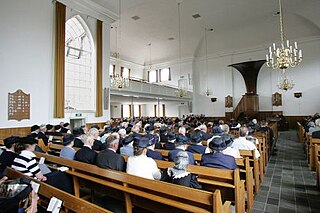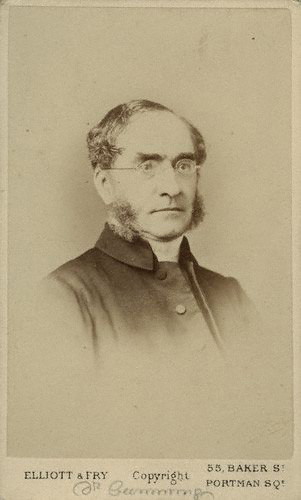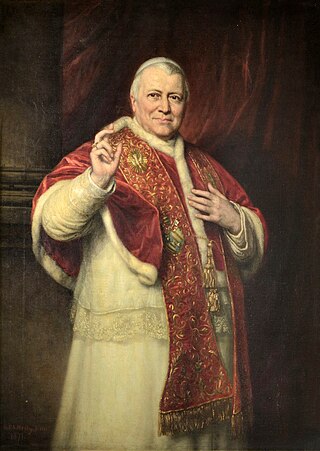Sola scriptura is a Christian theological doctrine held by most Protestant Christian denominations, in particular the Lutheran and Reformed traditions, that posits the Bible as the sole infallible source of authority for Christian faith and practice. The Catholic Church considers it heterodox and generally the Orthodox churches consider it to be contrary to the phronema of the Church.

The Dean Cemetery is a historically important Victorian cemetery north of the Dean Village, west of Edinburgh city centre, in Scotland. It lies between Queensferry Road and the Water of Leith, bounded on its east side by Dean Path and on its west by the Dean Gallery. A 20th-century extension lies detached from the main cemetery to the north of Ravelston Terrace. The main cemetery is accessible through the main gate on its east side, through a "grace and favour" access door from the grounds of Dean Gallery and from Ravelston Terrace. The modern extension is only accessible at the junction of Dean Path and Queensferry Road.
Biblical inerrancy is the belief that the Bible "is without error or fault in all its teaching"; or, at least, that "Scripture in the original manuscripts does not affirm anything that is contrary to fact". Some equate inerrancy with biblical infallibility; others do not.
The five solae of the Protestant Reformation are a foundational set of Christian theological principles held by theologians and clergy to be central to the doctrines of justification and salvation as taught by the Calvinism and Lutheranism branches of Protestantism, as well as in some branches of Pentecostalism. Each sola represents a key belief in these Protestant traditions that is distinct from the theological doctrine of the Catholic Church, although they were not assembled as a theological unit until the 20th century. The Reformers are known to have only clearly stated two of the five solae. Even today there are differences as to what constitutes the solae, how many there are, and how to interpret them to reflect the Reformers' beliefs.
John Flipse Walvoord was a Christian theologian, a pastor, and the president of Dallas Theological Seminary from 1952 to 1986. He was the author of over 30 books, focusing primarily on eschatology and theology, including The Rapture Question, and was co-editor of The Bible Knowledge Commentary with Roy B. Zuck. He earned AB and DD degrees from Wheaton College, an AM degree from Texas Christian University in philosophy, a Th.B., Th.M., and Th.D. in Systematic Theology from Dallas Theological Seminary, and a Litt.D. from Liberty Baptist Seminary.
The following outline is provided as an overview of and topical guide to Christian theology:

Andover Theological Seminary (1807–1965) was a Congregationalist seminary founded in 1807 and originally located in Andover, Massachusetts on the campus of Phillips Academy.
George Stanley Faber was an Anglican theologian and prolific author.
Biblical infallibility is the belief that what the Bible says regarding matters of faith and Christian practice is wholly useful and true. It is the "belief that the Bible is completely trustworthy as a guide to salvation and the life of faith and will not fail to accomplish its purpose."
The infallibility of the Church is the belief that the Holy Spirit preserves the Christian Church from errors that would contradict its essential doctrines. It is related to, but not the same as, indefectibility, that is, "she remains and will remain the Institution of Salvation, founded by Christ, until the end of the world." The doctrine of infallibility is premised on the authority Jesus granted to the apostles to "bind and loose" and in particular the promises to Peter in regard to papal infallibility.

Biblical inspiration is the doctrine in Christian theology that the human writers and canonizers of the Bible were led by God with the result that their writings may be designated in some sense the word of God. This belief is traditionally associated with concepts of the biblical infallibility and the internal consistency of the Bible.

James Hall Brookes was an American Presbyterian pastor, Christian leader and author. Brookes led congregations in Ohio and Missouri during a career spanning 43 years. He became a leader among his peers in the Niagara Bible Conference which led to editing The Truth: or, Testimony for Christ, a periodical. His legacy is also found in the many books, booklets and tracts he produced.

Reformed fundamentalism arose in some conservative Presbyterian, Congregationalist, Reformed Anglican, Reformed Baptist, Non-denominational and other Reformed churches, which agrees with the motives and aims of broader evangelical Protestant fundamentalism. The movement was historically defined by a repudiation of liberal and modernist theology, the publication (1905–1915) entitled, The Fundamentals, and had the intent to progress and revitalise evangelical Protestantism in predominantly English-speaking Protestant countries, as well as to reform separated churches according to the Bible, historic expression of faith and the principles of the Reformation. The Fundamentalist–Modernist controversy, and the Downgrade controversy, kindled the growth and development of reformed fundamentalism in the United States and the United Kingdom. Reformed fundamentalists have laid greater emphasis on historic confessions of faith, such as the Westminster Confession of Faith. Sixteenth century Reformers such as John Calvin, Martin Luther, John Knox, Theodore Beza, Philip Melanchthon and Protestant ministers such as Matthew Henry, John Gill, John Bunyan, George Whitefield, Jonathan Edwards, Charles Spurgeon, J. C. Ryle, John Burgon, F. B. Meyer, Dwight L. Moody, George Müller and G. Campbell Morgan have shaped the leaders in this reformed tradition.

John Cumming FRSE was a Scottish clergyman and religious author.

Martin John Spalding was an American prelate of the Roman Catholic Church. He served as bishop of the Diocese of Louisville in Kentucky (1850–1864) and as archbishop of the Archdiocese of Baltimore (1864–1872). He advocated aid for freed slaves following the American Civil War. Spalding attended the First Vatican Council, where he first opposed, and then supported, a dogmatic proclamation of papal infallibility.

Papal infallibility is a dogma of the Catholic Church which states that, in virtue of the promise of Jesus to Peter, the Pope when he speaks ex cathedra is preserved from the possibility of error on doctrine "initially given to the apostolic Church and handed down in Scripture and tradition". It does not mean that the pope cannot sin or otherwise err in some capacity, though he is prevented by the assistance of the Holy Spirit from issuing heretical teaching even in his non-infallible Magisterium, as a corollary of indefectibility. This doctrine, defined dogmatically at the First Vatican Council of 1869–1870 in the document Pastor aeternus, is claimed to have existed in medieval theology and to have been the majority opinion at the time of the Counter-Reformation.

Cessationism versus continuationism involves a Christian theological dispute as to whether spiritual gifts remain available to the church, or whether their operation ceased with the Apostolic Age of the church. The cessationist doctrine arose in the Reformed theology: initially in response to claims of Roman Catholic miracles. Modern discussions focus more on the use of spiritual gifts in the Pentecostal and Charismatic movements, though this emphasis has been taught in traditions that arose earlier, such as Methodism.
James Esdaile (1775–1854) was a Scottish minister and writer who spent his working life mainly at the East Church, Perth, Scotland.

St Aidan’s College was a Church of England theological college in Birkenhead, Cheshire, England, open from 1847 to 1970.

Alexander Black DD was professor of Exegetical Theology in New College, Edinburgh. Black was a native of Aberdeen, where he received his education, first at the Grammar School, and afterwards at Marischal College. After passing through the Divinity Hall, he was appointed assistant to Dr Ross, East Church, Aberdeen, and he was subsequently presented to the Parish Church of Tarves, as successor to Duncan Mearns. Upon the death of David Brown, Black in 1831 became his successor in the Professorship of Divinity in Marischal College. His knowledge of Hebrew and the cognate tongues procured him, in 1839, a place in a deputation sent by the General Assembly to Palestine. At the disruption, Black attached himself to the Free Church, and in 1844 was appointed to the chair of Exegetical Theology in the New College, Edinburgh, from which he retired in 1856. He was a versatile linguist who, it is said, could converse in nineteen languages and correspond in twelve.











